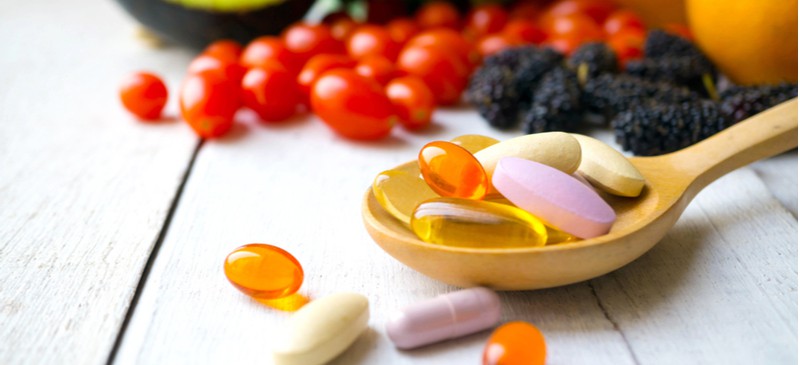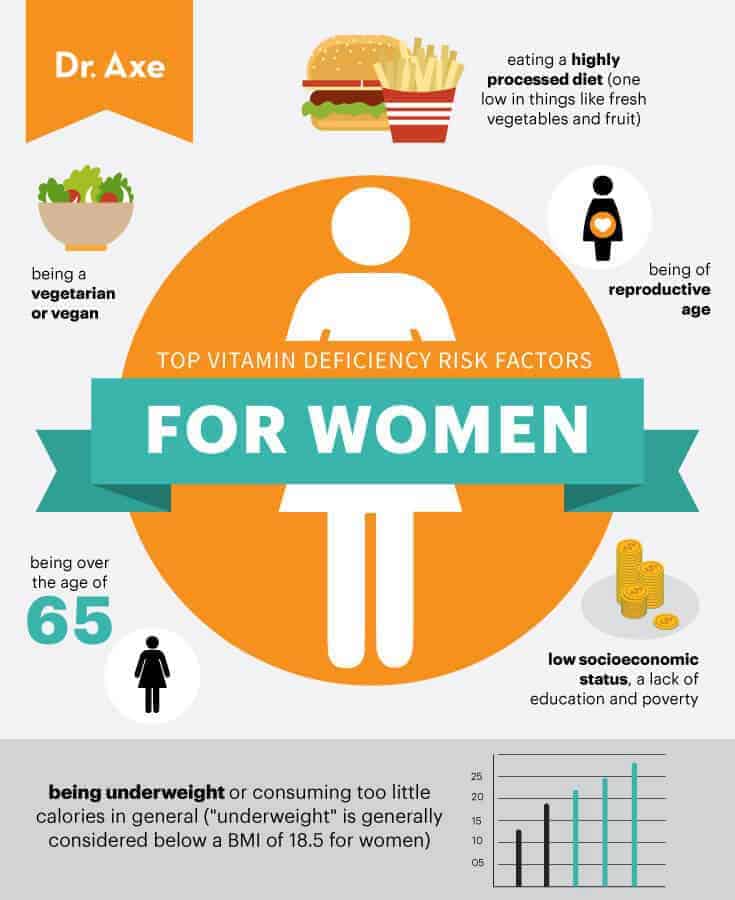This Dr. Axe content is medically reviewed or fact checked to ensure factually accurate information.
With strict editorial sourcing guidelines, we only link to academic research institutions, reputable media sites and, when research is available, medically peer-reviewed studies. Note that the numbers in parentheses (1, 2, etc.) are clickable links to these studies.
The information in our articles is NOT intended to replace a one-on-one relationship with a qualified health care professional and is not intended as medical advice.
This article is based on scientific evidence, written by experts and fact checked by our trained editorial staff. Note that the numbers in parentheses (1, 2, etc.) are clickable links to medically peer-reviewed studies.
Our team includes licensed nutritionists and dietitians, certified health education specialists, as well as certified strength and conditioning specialists, personal trainers and corrective exercise specialists. Our team aims to be not only thorough with its research, but also objective and unbiased.
The information in our articles is NOT intended to replace a one-on-one relationship with a qualified health care professional and is not intended as medical advice.
What You Need to Know About the Most Common Nutrient Deficiencies in Women
July 12, 2024

Studies have shown that women’s nutrient intake is highly dependent on not only their diets, but factors like their economic status, social and cultural environment, personal habits, age, level of activity, and genetics. Experts believe that some of the most common (although certain other deficiencies are still possible and somewhat common) nutrient deficiencies in women include those in:
- iron
- vitamin B12
- vitamin D
- calcium
- magnesium
- omega-3s
- iodine
- folate
Some of the ways that vitamin deficiencies in women can be reduced include eating a nutrient-dense diet and/or taking high-quality supplements, ideally those made from real food sources, which helps improve bioavailability.
It’s believed that around 30 percent of all women are deficient in one or more of the most important vitamins and minerals, and for many women the risk only increases with age.
Another scary finding? Estimates show about 75 percent of women would likely develop nutrient deficiencies if supplemental multivitamins didn’t exist.
What are the best vitamins for women to take, and what vitamins and minerals are women often deficient in?
Here are nine of the most common nutrient deficiencies in women:
1. Iron
Iron deficiency and anemia are the most prevalent nutritional deficiencies in the world, especially among women.
Not only does this deficiency affect a large number of children and women living in developing countries, but it is “the only nutrient deficiency which is also significantly prevalent in industrialized countries.”
It’s estimated that a staggering 30 percent or more of the world’s total population is anemic, often due to low iron levels.
Low iron/anemia can cause fatigue, hair loss, muscle weakness, brain fog, headaches, dizziness and other issues.
Older women, those with anemia, vegans and vegetarians should work with a doctor to make sure they get enough B vitamins and iron since they’re at the greatest risk for these deficiencies.
Adolescent girls are at the highest risk for iron deficiencies, and women in general need to be careful to get enough, since demand for iron increases during menstruation due to blood loss.
Some ways to increase iron intake include eating a variety of iron-rich foods and those that support enhancement of iron absorption (such as vitamin C foods), in addition to taking an iron supplement.
2. Vitamin B12
Deficiency in vitamin B12 could contribute to symptoms like issues with balance, constipation, weakness, dry skin and cognitive changes.
B12 plays an essential role in your health by producing hemoglobin, part of your red blood cells that helps the cells in your body receive life-giving oxygen.
3. Vitamin D
Vitamin d deficiency is one of the most common worldwide in both adult women and men (as well as babies and children).
Vitamin D can be produced in our bodies when exposed to adequate amounts of UVB radiation from sunlight. Its key role is to regulate calcium absorption.
Those with a vitamin D deficiency are unable to absorb that calcium and, in turn, have a hard time strengthening bones.
However, vitamin D has several other important roles for overall health, including supporting bone health, cardiovascular health, testosterone and immune function.
The National Institutes of Health says that “35% of adults in the United States are vitamin D deficient.”
Try to get 10–15 minutes of mid-day sun exposure of the face, hands and arms without protective sunscreen. This may be enough to maintain healthy vitamin D levels, depending on the time of year, latitude and skin pigmentation characteristics.
Remember, if your skin is starting to turn pink, you’ve gotten too much sun.
4. Calcium
Girls between the ages of 9 and 18 years, as well as women older than 50 years, are believed to be most likely to have low calcium levels.
Overall, between dietary sources and supplements containing calcium, many people still fall short of getting enough calcium — due to reasons including trouble absorbing it and calcium loss from meditations and intense exercise.
It’s especially important for postmenopausal women to avoid calcium deficiency because this can contribute to bone loss and increased risk for bone fractures/osteoporosis.
Women with lactose intolerance as well as vegans may also lack calcium because they avoid eating dairy products, which are some of the most convenient dietary sources.
Other factors can affect the amount of calcium absorbed from the digestive tract, including older age (being over 70) and low vitamin D status (vitamin D is needed for proper calcium absorption).
5. Folate
Requirements for many micronutrients increase when a woman is pregnant — especially nutrients like folate, iron, calcium, zinc, magnesium and iodine.
Folate (which is called folic acid when it’s created synthetically) is critical for a healthy pregnancy and developing fetuses because it helps build the baby’s brain and spinal cord. For pregnant women, supplementing with folate helps decrease the risk of certain birth defects, including spina bifida.
To limit the risk of side effects caused by folate deficiency, the American Thyroid Association also recommends all prenatal vitamins contain 150 micrograms of iodine, which should be taken during pregnancy and afterward while breastfeeding.

6. Potassium
In the U.S., the National Institutes of Health has determined that based on dietary surveys, many adolescent girls and adult women don’t consume enough potassium on a regular basis. This is why the 2020–2025 Dietary Guidelines for Americans identifies potassium as a “nutrient of public health concern.”
According data from large-scale studies conducted in the U.S., the average daily potassium intake from foods is 1,888 milligrams for females up to 19 years and 2,320 milligrams for women over 19. This falls short of the 2,300 to 2,600 milligrams that is recommended for teenage and adult women (or 2,900 for pregnant women).
Insufficient potassium intake can contribute to issues such as changes in blood pressure, higher kidney stone risk, interference with bone turnover, increased urinary calcium excretion and changes in salt sensitivity.
In addition to eating too few potassium-rich foods, low levels can be due to medication use, diarrhea, vomiting, poor kidney function, laxative use, inflammatory bowel disease and heavy sweating. Severe deficiency (hypokalemia) affects up to 21 percent of hospitalized patients, often due to use of diuretics and other medications.
More than 50 percent of individuals with clinically significant hypokalemia are also thought to have magnesium deficiency, since potassium and magnesium work together in many ways.
7. Iodine
According to the Centers for Disease Control and Prevention, women between the ages of 20–39 have the lowest urine iodine levels compared to all other age groups.
Iodine intake is especially important for young women looking to become pregnant or who are pregnant because it plays a role in brain development of the growing fetus. It’s also crucial for making proper amounts of thyroid hormones.
The thyroid gland requires iodine to produce the hormones T3 and T4, which help control your metabolism.
Most people eating a Western diet consume a good deal of iodized salt found in packaged foods and refined grain products, which has iodine added purposefully to help prevent deficiencies.
An even better way to get the iodine you need is from iodine-rich foods like sea veggies and seafood, the major natural dietary sources of this nutrient.
Avoiding an iodine deficiency helps protect you from conditions like hypothyroidism, goiters, fatigue, hormonal imbalances and trouble during pregnancy.
8. Magnesium
Magnesium is one of the most important minerals in the body but also one of the most common deficiencies. As an electrolyte, magnesium helps regulate calcium, potassium and sodium, and it is essential for over 300 different biochemical functions in the body.
On a global scale, there’s evidence suggesting that soil depletion has resulted in many crops being lower in magnesium than in past generations — plus health conditions like digestive disorders, leaky gut syndrome, chronic stress and ongoing medication use can all lower someone’s magnesium levels.
Leg cramps, insomnia, muscle spasms, anxiety, headaches and digestive issues like constipation can all be signs of magnesium deficiency.
For older women, the risk of deficiency might be even greater.
Studies have shown that many older people don’t eat magnesium-rich foods to begin with — plus they’re prone to experiencing reduced magnesium intestinal absorption, reduced magnesium bone stores and excess urinary loss.
Make sure to get enough by consuming magnesium-rich foods, such as leafy green veggies, sea vegetables/algae, beans, nuts and seeds, as it’s sometimes challenging to pack a day’s worth of magnesium into a multivitamin.
9. Omega-3
If you don’t consume seafood like salmon, mackerel, sardines, halibut or tuna regularly, chances are you can afford to take an omega-3 fish oil supplement to prevent an omega-3 deficiency.
Most people eating a “Western diet” consume plenty omega-6 fatty acids, which are pro-inflammatory and found in many packaged foods and vegetables oils, but not enough omega-3 fatty acids, which are anti-inflammatory.
The two need to balance each other out in order for the heart, brain and immune systems to stay the healthiest they can. A ratio of about 2:1 omega-6s to omega-3s is best, helping prevent conditions like arthritis, heart disease, Alzheimer’s, depression and more.
Eating wild-caught fish several times per week or taking a supplement equal to about 1,000 milligrams daily is the best way to beat inflammation and get enough omega-3s.
How Do You Know If You Have a Vitamin Deficiency?
There’s a wide range of symptoms that can be tied to vitamin and mineral deficiencies. Some of the more common signs of a nutrient deficiency in women can include:
- Hair loss
- Mild cognitive impairment, such as changes in memory, concentration, thinking or behavior
- Weakness
- Headaches
- Low libido
- Pale and dry skin
- Red, swollen gums
- Heart arrhythmia or irregular heartbeats
- Slow wound healing, yellowing of the skin and bruising
- Impaired immune function
- Mood changes
- Bone and joint pains and in some cases bone fractures
- Dry eyes and vision changes
- In severe cases, vitamin deficiency diseases such as scurvy, rickets, beriberi and pellagra (caused by very low vitamin C, vitamin D and B vitamin levels)
When a Healthy Diet Is Enough vs. When It Might Not Be
What causes a vitamin deficiency? Is it necessarily due to eating a poor diet?
Here’s what we know about women being at risk for vitamin deficiencies:
As a woman, you’re more likely to experience low levels of certain key nutrients if any of these apply to you:
- eating a highly processed diet (one low in things like fresh vegetables and fruit)
- being a vegetarian or vegan
- being underweight or consuming too little calories in general (“underweight” is generally considered below a body mass index of 18.5 for women)
- being of reproductive age (the World Health Organization estimates that in poorer countries 27 percent to 51 percent of women of reproductive age are deficient in key nutrients)
- being over the age of 65
- being of low socioeconomic status, a lack of education and poverty
- consuming high amounts of alcohol
- taking certain medications for an extended period of time (such as phenytoin, methotrexate, sulfasalazine, triamterene, trimethoprim-sulfamethoxazole)
- having a condition that interferes with normal nutrient absorption in the gut
Even if you feel you do eat a pretty nutrient-dense diet, some women are more susceptible to running low in important vitamins than others.
Here are some special circumstances that make a woman a good candidate for taking a high-quality, food-based multivitamin supplement daily to prevent common deficiencies:
- If you’re a vegetarian or vegan: Plant-based eaters who avoid meat are more likely to be low in B vitamins, such as vitamin B12, which is only found in animal foods. A lack of calcium, amino acids (protein), omega-3s, zinc, iodine and iron are also more common in women who don’t eat any animal products, which is why supplements are recommended. In 2009, the Academy of Nutrition and Dietetics (formerly the American Dietetic Association) began recommending that vegans and vegetarians make sure to cover their nutritional needs of the vitamins and minerals listed above, most easily by taking a daily multivitamin and omega-3 supplement.
- If you’re pregnant: Likely more than any other time in a woman’s life, pregnancy creates a special metabolic demand for high-quality nutrients, both to support the growing baby and the mother. Requirements for many micronutrients increase during pregnancy — especially nutrients like folate, iron, calcium, zinc, magnesium and iodine.
- If you’re over the age of 55: B vitamins, vitamin D, calcium and iron are all especially important for aging women. Consuming plenty natural food sources of these nutrients — such as leafy greens, cage-free eggs, grass-fed meat and organic/unsweetened dairy products — can help prevent deficiencies that raise the risk for problems such as bone loss/osteoporosis, fractures, heart problems, diabetes and cognitive decline.
You have the best protection against nutrient deficiencies if you eat enough calories in general, avoid crash or fad dieting, don’t overexert yourself or start overtraining, and if you focus on eating a varied diet that’s low in “empty calories.”
This means avoiding things like added sugar, refined grain products, packaged snacks and most refined vegetable oils.
Try to get the most “bang for your buck” by making your calories count, eating plenty fresh plant foods, clean protein foods and healthy fats.
Nutrient Deficiencies in Women During Pregnancy
Researchers have pointed out that for women of “reproductive age” who are preparing to have children, proper nutritional status before, during and after pregnancy is an important element of overall reproductive health.
This is why it’s vital for pregnant women in particular to ensure they get enough of the nutrients that women often fall short in.
Preventing nutritional deficiencies during pregnancy and when lactating helps:
- Maintain the health of the mother-to-be
- Lowers the risk of having a difficult pregnancy
- Prevents birth defects in the fetus/infant
- Helps lower the risk for certain chronic diseases developing later on in the child’s life
- Breast milk production is also highly influenced by a woman’s calorie, vitamin and mineral intake, which is why supplements are considered crucial for both pregnant and lactating moms
Final Thoughts
- What vitamins are we most deficient in as women? It’s thought that the most common nutrient deficiencies in women include those in iron, vitamin D, vitamin B12, calcium, potassium, folate, iodine, magnesium and omega-3 fats.
- Deficiencies in essential nutrients can cause many symptoms, such as fatigue, weakness, cognitive impairment, weak bones, changes in heart rhythms and blood pressure, slow wound healing, and many others.
- The best way to prevent nutrient deficiencies in women is to eat a nutrient-dense diet that includes a variety of foods (derived from both plants and animals) and/or to supplement if necessary. Sunlight exposure, eating enough calories in general, limiting alcohol consumption and certain medications, and avoiding overtraining and fad-dieting can also limit a woman’s risk.

